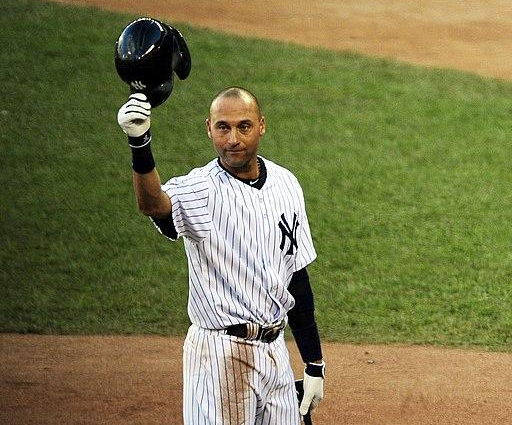WeSalute Awards
Derek Jeter, Son of Two Army Veterans
WeSalute (founded as Veterans Advantage)

Editor's note: On January 21, 2020, Derek Jeter was voted into the Major League Baseball Hall of Fame on his first ballot since retiring in 2014. We honored Jeter with our "VetFamily" award during that final season, and have re-published it in honor of his latest historic achievement.
Derek Jeter’s superstar achievements confirm the New York Yankee traditions that have preceded him. But, unlike many of history’s prior pinstripe legends, the true measure of Jeter’s success is due to his play on and off the field – and it comes thanks in large part to his parents who both served in our nation’s military.
"When you think about being a good sportsman, there's a lot of things that come to mind," Jeter said after winning the 2009 Sports Illustrated Sportsman of the Year. "People tell you it's success on the baseball field, and I think that's part of it. I also think there's a lot of qualities that go into it -- hard work, dedication, pride, humility. These are all things that I learned at a very young age."
Jeter had a dramatic finish to his 19-year career that ended with a game-winning hit in his final at-bat at Yankee Stadium, and an RBI single in his final career at-bat in Fenway Park, the home of longtime nemesis Boston Red Sox. And amid the cheers were the accolades as it relates to the man's character.
"It’s been a blessing,” said New York Yankees manager Joe Girardi, also a product of a military upbringing, after the shortstop’s final major league game. "To manage a guy that is what you want in every player. What you want every player to care about. What you want every player to fight for. What you want every player to do." In addition to being Jeter's final manager, he was also a teammate at the beginning of Jeter's historic arc in Yankee lore for Jeter's first full season and World Series Championship in 1996.
Since then, Jeter racked up 14-time All-Star games -- including one MVP for the midsummer classic -- and five World Series Championships. Jeter is also the winner of Major League Baseball’s highest honor for off-the-field achievement: The Roberto Clemente Award, which he won in 2009 for his work with his own “Turn 2” Foundation helping kids lead a positive lifestyle away from drugs and alcohol.
That day, his first words when he entered the crowded interview room to accept the award was "Hi Momma," to Dorothy Jeter, his mother, and Foundation treasurer. Turn 2 leadership also includes his sister Sharlee and his father, Dr. Sanderson Charles Jeter.
"You're a wonderful role model not only for the youth of America, but also for our players. You have been the face of baseball for many years, and you're truly deserving of this award. I don't want to embarrass Derek, but a player like Derek Jeter, it makes me very proud to be the Commissioner of Baseball," said Commissioner Bud Selig.
He has also captured the fascination of gossipmongers and paparazzi alike -- all trying to get the latest on his girlfriends, net worth, and Florida mansion -- but "Jeet" managed to keep his image clean every step of the way. Even Fortune Magazine added him to its 2014 list of the world’s great leaders. He reached #11, the highest-ranking sports star, player or coach, on the list, which was just two slots below the Dali Lama, and four slots above former NYC Mayor Michael Bloomberg.
Charles and Dorothy met while both were stationed in Germany serving in the US Army in 1972 when their roommates asked them along for a double date. They fell in love and were married shortly thereafter. Charles played basketball at Fisk University in Tennessee, where he received a business degree, and following graduation, enlisted in the Army. After military service, he became an alcohol and drug counselor, with a focus on troubled children and teens, earning a Masters and Doctorate, while Dorothy became an accountant.
Family life for the Jeters, a bi-racial marriage, presented some social challenges, but that only inspired the family to redouble their efforts to create a nurturing and positive environment inside the home. Before every school year, Derek and his younger sister Sharlee had to sign a handwritten contract that spelled out things such as their study habits, expected grades, early curfew times and rules regarding drugs and alcohol use (none).
In essence, it was a “Code of Conduct,” and a standard to live by.
Derek remembered: "We weren't allowed to use the word can't -- 'I can't do this, can't do that.' My mom would say, 'What? No.' She's always positive."
''Derek had goals,'' said his mother, Dorothy in a New York Times article very early in his Yankee career, ''but he knew if he wanted to play in the Little League All-Star game or go to baseball camp, he better come home with a 4.0, he better have his behavior intact and he better make curfew or he wasn't going anywhere.''
In one example, dad’s influence on the field was very apparent:
After his Little League team lost, Jeter refused to join the handshake line to congratulate the winning team. “Charles got in his son’s face and made a tough love stand,” writes Jeter biographer Ian O’Connor. “`It’s time to grab a tennis racket,’ he barked at Derek, ‘since you obviously don’t know how to play a team sport.’”
Apparently, based on the Hall of Fame-caliber career that soon followed, Derek Jeter did not need to be given that lesson a second time.
Seeking even higher levels of team play, Jeter wanted to start a foundation for kids because Dave Winfield, his favorite player, was one of the first athletes known for having a foundation. By his second season, Turn 2 was formed, and Derek’s father soon quit his private practice to help manage the foundation, as he still does today.
''It wasn't a hard decision. I saw this as a chance to work with Derek beyond the father-son relationship,” Derek’s dad said.
In the nearly 20 years since, the foundation has posted its own All-Star caliber stats: It has awarded nearly $20 million in grants to help children get on the straight and narrow and avoid drugs and alcohol. And at his last game, the Boston Red Sox donated $22,222.22 to Jeter's Turn 2 Foundation, bringing to $599,888.88 the total charitable donations collected from Major League Baseball teams during all his tributes at ballparks across America.
Kids making it through the Turn 2 system are called “Jeter’s Leaders.” The Leaders are expected to model positive behavior and deliver a message to their peers focusing on staying in school, remaining drug and alcohol-free and giving back to the community and following Derek’s own code of conduct, called the 10 Pillars of Leadership:
1. Morality
2. Communication
3. Taking Initiative
4. Being Trustworthy
5. Being Respectful
6. Being Responsible
7. Being Organized
8. Leading by Example
9. Having a Positive Attitude
10. Living a Healthy Lifestyle
“I congratulate the 2013 Jeter’s Leaders, and I hope each of you takes pride in your accomplishments. Please know I am counting on you to continue to set positive examples in your communities and serve as role models to your peers,” President Obama urged the group in a letter he wrote at the time.
Nearly 20 seasons later, with five World Championships and millions of inspired kids along the way, Jeter left fans wishing the ride would never end. One banner held by a fan over the weekend's final games implored people not be sad that his career is over, but instead be happy that we got to witness it.
Above it all, he has been a winner. Jeter's stats make him the Yankees all-time career leader in hits, games played, stolen bases, and at-bats. Most importantly, he has dedicated himself and served as an inspirational role model for our youth to lead important and productive lives, to be winners in life.
(image credit: Jacob Donohue)


